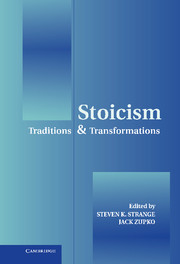Book contents
- Frontmatter
- Contents
- List of Contributors
- Acknowledgments
- List of Abbreviations
- Stoicism
- Introduction
- 1 The Socratic Imprint on Epictetus' Philosophy
- 2 The Stoics on the Voluntariness of the Passions
- 3 Stoicism in the Apostle Paul: A Philosophical Reading
- 4 Moral Judgment in Seneca
- 5 Stoic First Movements in Christianity
- 6 Where Were the Stoics in the Late Middle Ages?
- 7 Abelard's Stoicism and Its Consequences
- 8 Constancy and Coherence
- 9 On the Happy Life: Descartes vis-à-vis Seneca
- 10 Psychotherapy and Moral Perfection: Spinoza and the Stoics on the Prospect of Happiness
- 11 Duties of Justice, Duties of Material Aid: Cicero's Problematic Legacy
- 12 Stoic Emotion
- Works Cited
- Name Index
- Subject Index
12 - Stoic Emotion
Published online by Cambridge University Press: 11 July 2009
- Frontmatter
- Contents
- List of Contributors
- Acknowledgments
- List of Abbreviations
- Stoicism
- Introduction
- 1 The Socratic Imprint on Epictetus' Philosophy
- 2 The Stoics on the Voluntariness of the Passions
- 3 Stoicism in the Apostle Paul: A Philosophical Reading
- 4 Moral Judgment in Seneca
- 5 Stoic First Movements in Christianity
- 6 Where Were the Stoics in the Late Middle Ages?
- 7 Abelard's Stoicism and Its Consequences
- 8 Constancy and Coherence
- 9 On the Happy Life: Descartes vis-à-vis Seneca
- 10 Psychotherapy and Moral Perfection: Spinoza and the Stoics on the Prospect of Happiness
- 11 Duties of Justice, Duties of Material Aid: Cicero's Problematic Legacy
- 12 Stoic Emotion
- Works Cited
- Name Index
- Subject Index
Summary
A successful rehabilitation of Stoic ethics will have to defeat the idea that there is something deeply wrong, and perhaps even psychologically impossible, about the kind of emotional life that Stoics recommend. The image of the austere, dispassionate, detached, tranquil, and virtually affectless sage – an image destined to be self-refuting – has become a staple of anti-Stoic philosophy, literature, and popular culture. It has been constructed from incautious use of the ancient texts and is remarkably resistant to correction. Reminders that the ancient Stoics insisted that there are good emotions are typically brushed aside by asserting that the ancient catalog of such emotions is peculiar; that the emotions in even that peculiar catalog are not accorded much significance by Stoics; and that the ruthless emotional therapy practiced by Epictetus is a reliable guide to the sort of emotional life Stoics want all of us to cultivate – namely, a life of desiccated affect and discardable attachments.
Both Stoics and anti-Stoics alike have developed an unwholesome fascination with a picture of the Stoic sage drawn for extreme circumstances. We persist, in high art and low journalism, in telling and retelling stories of good people who resolutely endure horrors – injustice, torture, disease, disability, and suffering. Those of us who are attracted to Stoicism often find such stories inspiring, and even anti-Stoics give them grudging admiration. But our fascination with them can be seriously misleading.
- Type
- Chapter
- Information
- StoicismTraditions and Transformations, pp. 250 - 276Publisher: Cambridge University PressPrint publication year: 2004
- 5
- Cited by

